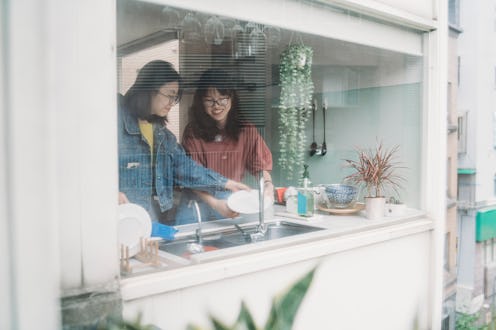Life
What Happens To Your Body When You’re Inside Too Much, According To Experts

Sometimes it's necessary to spend a day cuddled up on the couch watching Netflix, but spend too much time inside, and you might find that your health begins to suffer. The effects of being inside too long might already be cramping your style, but you might not even realize they're a result of spending most of your time cooped up.
"Staying inside all the time may lead to one missing out on several health benefits of sunlight," NYC-based physician Dr. Nesochi Okeke-Igbokwe, M.D., M.S., tells Bustle. "Exposure to the sun is essential as it can help with the regulation of one's circadian clock, it enables the body to synthesize vitamin D, and additionally helps to improve one's mood."
Boosting your mood comes in part from the burst of mindfulness that can accompany you outside, says Meaghan Rice, Psy.D., L.P.C., a Talkspace therapist, trainer, and peer consultant. "Being able to observe the clouds in the sky, the birds chirping, and trees swaying in the breeze allows us to shift our energy and be present in the here and now," she tells Bustle. This enhanced focus on the world around you (instead of the anxieties battling for attention) can help soothe you on a tough day, Rice says.
It's easy to spend all your time in the comfort of your home or office, but you want to make sure you're getting outside every now and again. If these seven signs that you might be spending too much time inside sound like you, it might be your cue to slip on your shoes and blinking, step into the sun.
1Moodiness
"When we are inside all day, we are more likely to be sedentary and less social, and this tends to have a negative impact on our mood," Indiana University Health psychiatrist Danielle Henderson, Ph.D., tells Bustle. "We are less interactive and engaged, which decreases opportunity for activating and reinforcing activities." You need sunlight to increase your level of serotonin, the mood-boosting neurotransmitter. Low levels of serotonin are often linked with mood swings and depression, but heading outdoors can help bring these levels back up.
2Anxiety & Restlessness
"Anxiety can build up and increase when we're inside for great lengths of time," Rice tells Bustle. If you're feeling extra restless, she says, it may mean you need to take a break and step outside. The anxiety from being cooped up can bottle pent-up energy in your body, leading to feelings of being "stir-crazy" and extra irritable. When you're starved of outside sun and stimulation, Henderson says that you might "become upset more easily than usual or become upset by seemingly minor things."
3Sleep Troubles
"Exposure to light is important for our body's internal clock, or circadian rhythm," says Henderson. "Our circadian rhythm responds to stimuli in our environment, largely light and darkness. During the day, signals are sent from our brain to other parts of our body that allow us to stay alert and awake. At night, our brain releases melatonin, which helps us sleep."
If you're finding yourself having trouble catching zzzs at night, Rice suggests cultivating a solution during the day. For just a few minutes each hour, she says to try "opening the window, taking a step into the fresh air, or catching some sunlight on a quick stroll." This can increase your sun exposure and help soothe your sleep troubles.
4Poor Immune System
"The body needs sufficient amounts of sunlight to make vitamin D," says Dr. Okeke-Igbokwe. If you're indoors too much, you might become deficient in this vitamin, which is a key nutrient in helping to build a strong immune system. Neglecting your immune health (and sunshine time) can make it more difficult to fight off disease.
5Bone & Muscle Weakness
Another side effect of not getting enough vitamin D from sunlight is bone pain and muscle weakness, Dr. Okeke-Igbokwe says. According to a 2019 article published in The Permanente Journal, low levels of vitamin D are also linked to chronic pain. If you're experiencing muscle weakness, and are unable to go outside to help your vitamin D levels, a light therapy box may be able to help.
6Changes In Appetite
Your circadian rhythm can also affect your appetite, according to a 2019 study published in the journal Cell Metabolism. When you're hungrier than usual, staying inside might be playing a part. Rice tells Bustle that appetite changes can also be tied to the heightened anxiety that often accompanies feeling stuck indoors.
7Fatigue
Rice says that staying inside for too long can cause "increased chronic ruminations and overwhelming amounts of hopelessness or lethargy." She tells Bustle that these kinds of anxiety spirals probably won't make it any easier for you to get good sleep at night, which is likely to leave you exhausted in the morning. Cue that hopelessness and lethargy once you're awake but still sleepy, and you've got yourself a tough pattern of emotional and bodily fatigue. So if you find yourself low on energy (physical and otherwise), it might be time to head outside.
Studies Referenced:
Cai, C. (2019) Treating vitamin D deficiency and insufficiency in chronic neck and back pain and muscle spasm: A case series. The Permanente Journal, http://www.thepermanentejournal.org/issues/2019/fall/7219-vitamin-d.html.
Cedernaes, J. (2019) Transcriptional basis for rhythmic control of hunger and metabolism within the AgRP neuron. Cell Metabolism, https://www.cell.com/cell-metabolism/fulltext/S1550-4131(19)30063-4.
Experts:
Dr. Nesochi Okeke-Igbokwe, M.D., M.S., NYC-based physician
Danielle Henderson, Ph.D., Indiana University health psychiatrist
Meaghan Rice, Psy.D., L.P.C., Talkspace therapist, trainer, and peer consultant
This article was originally published on